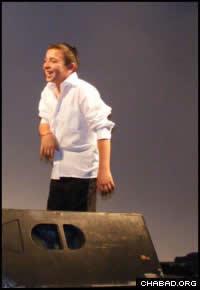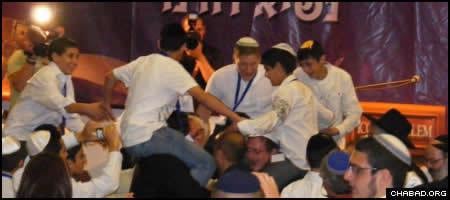JERUSALEM – Since its liberation from Jordanian occupation in 1967, the Western Wall has seen its share of crowds. Aside from the tourists, Jewish and non-Jewish, who flock to the holy site daily, every week, scores of Israeli families celebrate their sons’ Bar Mitzvahs at the kotel, as the wall is known in Hebrew.
But even the Western Wall, etched into the Jewish consciousness since the destruction of the Holy Temple two millennia ago, has rarely seen a celebration like the one that took place there Monday afternoon. In a mass expression of Jewish pride, and reflecting their entry into religious “adulthood,” some 108 young men stood at the foot of the stone edifice for a Bar Mitzvah ceremony that many of their parents – cut down in the prime of their lives – couldn’t witness.
Organized by Colel Chabad, a Chabad-Lubavitch social-welfare institution operating in the Holy Land since 1788, and the Western Wall Heritage Fund, the festivities drew participants from across the country. Waiting for them were both of the country’s chief rabbis, a slew of Knesset legislators – including the parliamentary speaker Reuven Rivlin – and Religious Services Minister Ya’akov Margi.
Many of the families arrived before lunchtime to enjoy a walk around the capital’s Old City and see its historical sites, including the Western Wall tunnels, recent excavations at the southern edge of the Temple Mount, and the newly-restored Hurva Synagogue.
For the ceremony, each boy took his place at one of several dozen Torah-reading stations, donned the Jewish prayer boxes known as tefillin, and made the traditional blessings over the Torah. Margi presented each boy with his own pair of tefillin and a certificate, before everyone was bussed to Jerusalem’s International Convention Center for a full-length performance by popular children’s entertainer Amiram Dvir and a lavish dinner.

Part of Something Special
According to Rabbi Zalman Duchman, a New York-based Colel Chabad administrator who travelled to Israel for the event, the annual celebration has its roots in directives issued by the Rebbe, Rabbi Menachem M. Schneerson, of righteous memory, in the wake of mass Russian Jewish immigration to Israel in 1991. Aware that a large portion of the immigrants had little or no Jewish education, Colel Chabad, in coordination with local rabbis and school authorities, moved to fill the gap and provide religious instruction, including the yearly bar mitzvah ceremony surrounding the anniversary of the Rebbe’s birth.
In recent years, the program shifted priorities to focus on the needs of Israeli orphans. As with last year’s event, the number of participants corresponded with the number of years since the Rebbe’s birth in 1902.
“The death of a parent has left many of these families in dire financial straights,” said Duchman. “And even in cases where finances are not an issue, it can be very, very difficult for families to contemplate celebrating a Bar Mitzvah without Mom or Dad.”
A third portion of the celebrants this week included boys who already celebrated their Bar Mitzvahs, “but wanted to take part in this very special occasion,” added Duchman. “It’s a time to get together with other boys and families who have gone through the pain of losing a parent, and it lets them know they are not alone.”
At the ceremony, Rivlin blessed the boys with a quote from the Book of Ecclesiastes.
“A good name is better than precious oil,” he said, encouraging the boys to make positive contributions in spite of their difficult circumstances. “Sometimes life can be tough, to say the least. May you have the strength to move forward and to live for the future.”
Later on, Prime Minister Binyamin Netanyahu, who was in Washington, D.C., to meet with U.S. President Barack Obama and address the annual policy conference of the American Israel Public Affairs Committee, blessed the participants in a previously-recorded message.
“108 years ago, a symbol of benevolence was born, the Lubavitcher Rebbe,” said Netanyahu, speaking in Hebrew. “And today, we have 108 Bar Mitzvah celebrants. I am sorry I’m not able to celebrate in person, but I want to bless each of you that from today, you enjoy your equal rights and responsibilities as members of the Jewish people.”
One of the boys, Or Lankri, said afterwards that the day represented the culmination of intensive Jewish training at the hands of Chabad-Lubavitch emissaries over the past year. In Lankri’s case, he learned with Rabbi Binyamin Meir Kali, co-director of Chabad Naveh Ramat in his hometown of Ramat Gan. Like the other boys, Lankri learned about Jewish concepts of charity, Torah laws, how to pray, and other subjects.
“My dad died in a car crash a year-and-a-half ago,” said the boy, the pain of loss still fresh in his eyes. “But Rav Benny has been a great friend. It’s not only that he taught me my Bar Mitzvah, but he’s always been there to talk, or just to hang out with me.
“Of course I miss my dad a lot, and having my bar mitzvah without him has been really hard,” he added. “But being part of something so big is really special.”




Start a Discussion